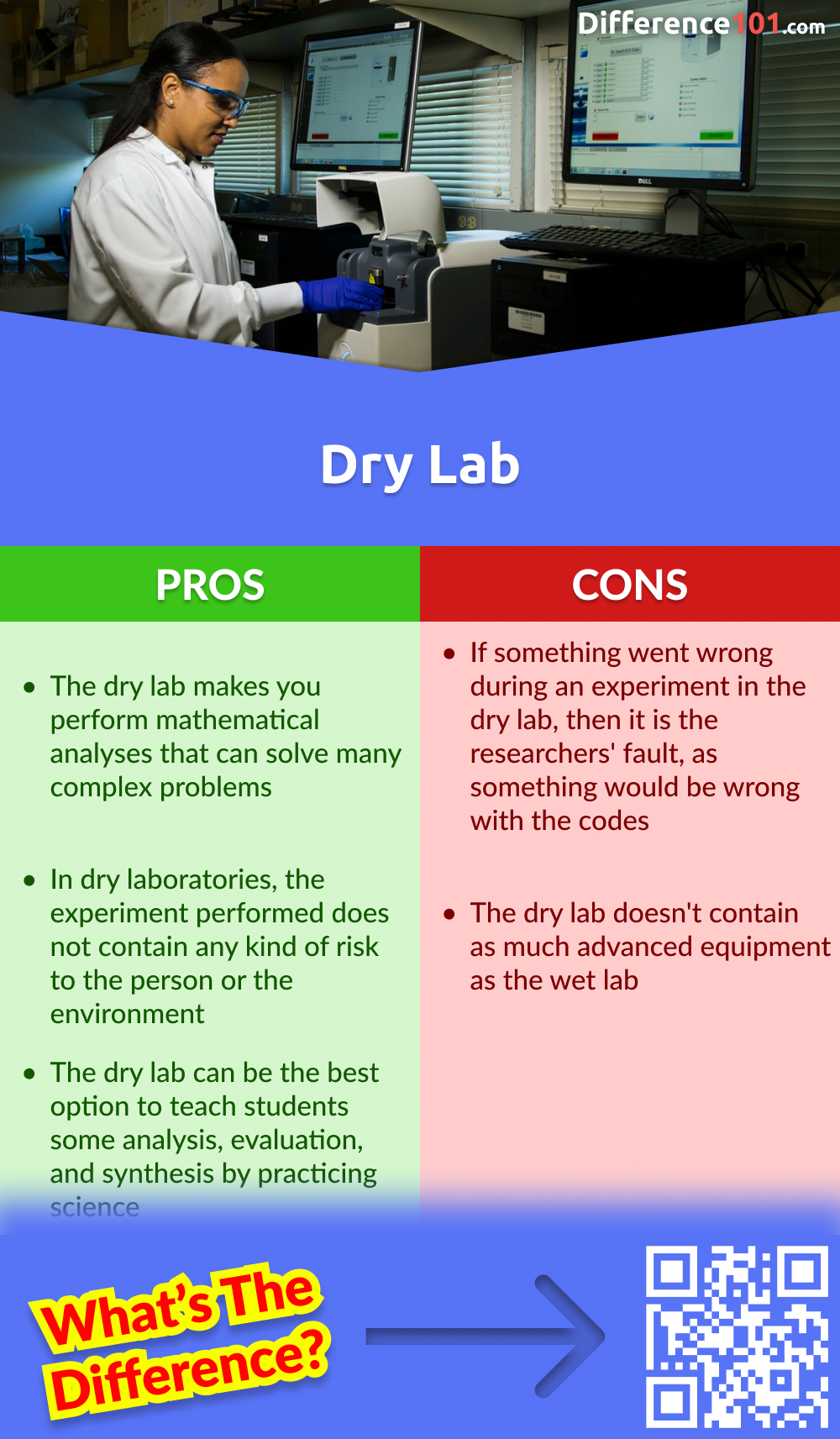Wet Lab vs. Dry Lab: wet lab and dry lab are opposite environments, but both play an essential role in scientific research and discoveries. Most scientific research requires data both from the wet lab and dry lab. But these are different from each other as well. The main difference between dry lab and wet lab is that the dry lab focuses on physics, engineering, and computation. While the wet lab is used for manipulating liquids, chemicals, and biological matters.
Let’s take a closer look at Wet vs. Dry Lab
| Role In Science | Both dry lab and wet lab play an essential role in science research. |
| Equipment | The computer is used in dry labs, while the wet lab has different types of equipment. |
| Experiments | Wet lab experiments require a wet laboratory, while dry lab experiments can also be done offline. |
| Analysis | The wet lab uses liquid for analysis, while the dry lab uses electronic equipment. |
Table of Contents
What is a Wet Lab?

Let’s look at the wet lab definition. It is the type of research laboratory in which different kinds of experiments are performed, and all the experiments involve dealing with liquid substances. These labs are specially designed to handle chemical and potential wet hazardous products. The researchers that work in wet lab research must have complete knowledge of wet lab techniques and safety procedures. Most of the scientists who work in the wet laboratory have a degree in their chosen field, which is necessary to learn all the wet lab skills.
What is a Dry Lab?

The dry lab definition is A lab where computational and mathematical analyses are done on electronic equipment like computers and other digital devices. These labs are specially designed to store large electronic instruments. These laboratories are built for analytical purposes and require a proper temperature and humidity control system. Dry labs are one of the most important elements of modern-day scientific research. Because the research done in dry labs helps scientists predict the phonemes with a high accuracy rate.
5 Key Differences Between Wet Lab and Dry Lab
| Components | Wet Lab | Dry Lab |
|---|---|---|
| Definition | Wet labs are the laboratories where chemicals and drugs are tested and analyzed by using liquids. | Dry labs are the labs where mathematical analysis and computational work are done by digital equipment. |
| Lab Design | Wet labs are designed with refrigerators, freezers, and safety cabinets to avoid the spillage of hazardous liquids. | Dry labs are designed to control and support the humidity and cooling levels. |
| Lab Material | The wet lab has material and the lab finishes, which are resistant to bacteria and chemicals. | The dry lab Has a clean power system research instrument, network communication, and sensitive computers. |
| Major Consideration | Because of the nature of work handling liquids wet lab required direct ventilation and piping, a hot safety system, benches, and sinks. | Because of the nature of work in a dry lab, the major consideration Is an effective integrated communication system. |
| Inside Lab Equipments | Wet labs contain different types of equipment with varied functions for handling and sampling chemicals. | In the dry lab, computers are used to carry out the modeling, analysis, and simulation. |
Wet Lab vs. Dry Lab Pros and Cons
Wet Lab Pros and Cons

Pros of Wet Lab
- The wet lab plays an important role in scientific research by handling a range of biological matters, liquids, and chemicals.
- Working in a lab can increase the ability of a person to learn how to use new equipment and help in future work.
- The equipment found in the wet lab is more advanced if we compare wet vs. dry lab
Cons of Wet Lab
- Wet labs handle liquids and hazardous chemicals, which can be very dangerous if not used carefully.
- Sometimes, results can go out of control due to some bad reagent or temperature inconsistencies.
Dry Lab Pros and Cons

Pros of Dry Lab
- The dry lab makes you perform mathematical analyses that can solve many complex problems.
- In dry laboratories, the experiment performed does not contain any kind of risk to the person or the environment.
- The dry lab can be the best option to teach students some analysis, evaluation, and synthesis by practicing science.
Cons of Dry Lab
- If something went wrong during an experiment in the dry lab, then it is the researchers’ fault, as something would be wrong with the codes.
- The dry lab doesn’t contain as much advanced equipment as the wet lab.
Comparison Chart

Comparison Video
FAQs
What Is Dry Lab Research?
Dry lab research is a mathematical analysis done through a computer or other digital equipment.
What Is A Dry Lab Project?
A dry lab project is scientific research in which scientists use computer-generated models to stimulate physical scenarios.
What Is A Wet Lab in Medicine?
According to a medical wet lab definition, it is a laboratory that involves proper ventilation and equipment for experimentation and scientific research.
What Is Wet Science?
Wet science involves the scientific research in which liquids and chemicals are used for experimentation.
Is Chemistry A Wet lab?
Both dry and wet labs are involved in chemistry. Dried chemistry works with dried reagents and buffers, while wet chemistry is the experiments done in the liquid phase.
Conclusion
Wet lab and dry lab both play an important role in scientific research and analysis. But if we compare dry lab Vs. wet lab. The main difference between them is due to their environment and equipment. A wet lab meaning a lab with liquid; this lab consists of different equipment that handles the liquid and chemicals. On the other hand, the Dry lab consists of computer-generated models, on which computational and mathematical analyses are done. The dry lab doesn’t contain any risk as all the calculations take place on computers. While wet labs have hazardous liquids, researchers should be aware of wet laboratory skills before performing any wet-lab experiments.








